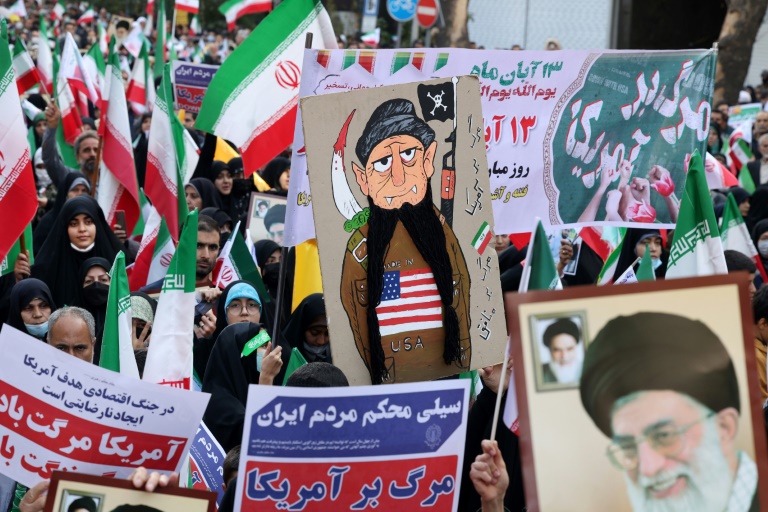Iranians wave their country's national flag at a rally outside the former US embassy in Tehran
Cities in western Iran went on strike Wednesday in solidarity with mourners marking 40 days since security forces killed dozens in a crackdown on protests in the country’s strife-torn southeast, rights groups said.
Security forces opened fire on protests that erupted on September 30 after weekly prayers in Zahedan, capital of the restive province of Sistan-Baluchistan on Iran’s border with Pakistan.
It came two weeks after demonstrations broke out across Iran over the death of Mahsa Amini, a 22-year-old Iranian of Kurdish origin, following her arrest in Tehran for allegedly flouting the country’s strict hijab dress rules for women.
The crackdown on nationwide protests since her death has killed at least 304 people, including 41 children and 24 women, says the Oslo-based group Iran Human Rights (IHR).
Activists were seen distributing fliers calling for protests in all cities Wednesday for the 40-day mourning ceremony of Zahedan’s “Bloody Friday”, in a video shared by the 1500tasvir social media channel.
Widespread strikes were held “in solidarity” with Zahedan in the Kurdish western cities of Baneh, Bukan, Kermanshah, Marivan, Sanandaj and Amini’s hometown of Saqez, said the Norway-based Hengaw rights group.
Videos published by the US-based Human Rights Activist News Agency (HRANA) showed shops shuttered in Saqez and in Zahedan itself.
The trigger for the violence that IHR said left at least 92 dead in Zahedan on September 30 was the alleged rape in custody of a 15-year-old girl by a police commander in the province’s port city of Chabahar.
– ‘Angry and frustrated’ –
But analysts say the Baluchis were inspired by the protests that flared over Amini’s death, which were initially driven by women’s rights but expanded over time to include other grievances.
“The 2022 protests are a convergence of angry and frustrated Iranians with the same goal, overthrowing the Islamic republic and a theocratic regime,” Saeid Golkar, assistant professor with the University of Tennessee at Chattanooga, told AFP.
Poverty-stricken Sistan-Baluchistan province is a flashpoint for clashes with drug smuggling gangs, as well as rebels from the Baluchi minority and Sunni extremist groups.
Activists have long complained the region has been the victim of discrimination by Iran’s Shiite clerical leadership, with disproportionate numbers of Baluch killed in clashes every year and also hanged in executions.
The latest executions were announced on Wednesday.
The judiciary’s Mizan Online website said two men, Rashid Baluch and Eshaq Askani, were put to death on Tuesday after being convicted of killing four police officers in 2016.
Protests over Amini’s death have shown no signs of abating despite the brutal crackdown and a campaign of mass arrests that has netted artists, journalists and lawyers.
Young women have led the way, removing and burning their head coverings, chanting anti-regime slogans and confronting security forces on the street.
– ‘Systematically silencing women’ –
Iran has struggled to suppress the protests that have evolved into its biggest challenge since the 1979 Islamic Revolution.
Security forces have fired directly on protesters using live ammunition, bird shot, tear gas and even paintballs.
Authorities have also imposed internet restrictions, including blocks on Instagram and WhatsApp, and have even deployed mounted police on Tehran’s streets.
The Islamic Revolutionary Guard Corps was accused this week of issuing death threats against two journalists working for the London-based Persian-language Iran International television channel.
The Saudi-linked channel’s owner, Volant Media, said the pair had received formal “warnings of credible threats to their lives” and those of their families, from London’s Metropolitan Police.
In response, Iran’s Intelligence Minister Esmail Khatib warned Britain it would “pay” for what it labelled actions to destabilise the Islamic republic.
Khatib also accused Iran’s major regional rival Saudi Arabia of financing media outlets behind the wave of unrest, state news agency IRNA reported on Wednesday.
Among those detained in Iran’s crackdown have been an unprecedented number of female journalists, including Niloufar Hamedi and Elahe Mohammadi, two newspaper journalists who first drew public attention to Amini’s death.
“The increasing detention of female journalists symbolically reveals the Iranian regime’s intention to systematically silence women’s voices,” Reporters Without Borders (RSF) said Wednesday.











